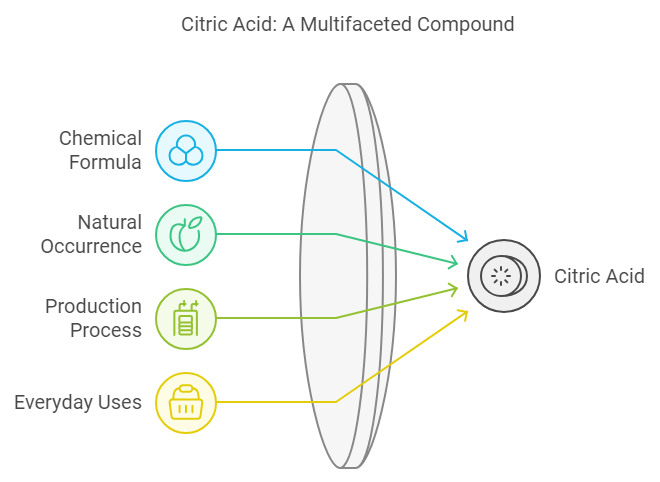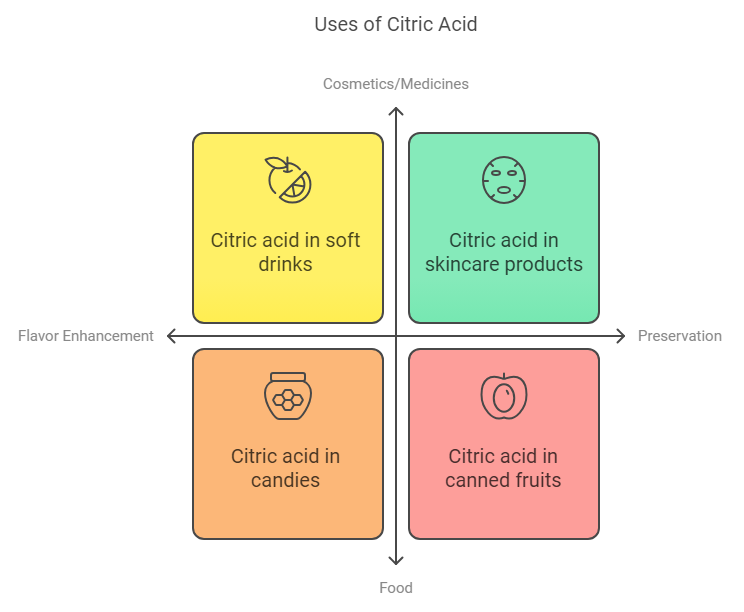Citric Acid: Citric acid has a chemical formula of C₆H₈O₇. It’s a weak organic acid that occurs in citrus fruits such as lemons, limes, and oranges. This acid gives these fruits their sour taste. Besides its natural presence, citric acid is also made through fermentation. In this process certain fungi like Aspergillus niger break down sugars to produce citric acid. If you want to know about its everyday uses, citric acid is a common component in food, drinks, medicines, and cleaning products.


Citric acid has an important role to play, both in nature and in human applications:
In Nature: Citric acid is part of the citric acid cycle (Krebs cycle), which is key to cellular respiration. It helps cells in plants, animals, and humans generate energy by breaking down sugars, fats, and proteins.
In Food Industry: People use it a lot to add flavor, keep food fresh, and make drinks stable. Its tangy taste makes many products taste better.
In Pharmaceuticals: Citric acid helps make medicine easier to swallow and last longer. It also aids the body in absorbing the key parts of the medicine.
Citric acid has plenty of practical uses that make it a common and key substance in our everyday lives:

Flavor Enhancer: Citric acid gives a sharp or sour taste, which adds flavor to soft drinks, candies, and fruit-flavored products.
Preservative: Food manufacturers add it to increase shelf life. Citric acid lowers the pH level in foods creating an environment too acidic for bacteria and mold to grow.
pH Control: In many cases, citric acid helps to control acidity levels, which keeps products like cosmetics, medicines, and food stable and safe to consume.
Antioxidant: It works as an antioxidant stopping fats and oils from going bad, which helps to preserve the flavor and quality of food.
Here are some typical ways citric acid has a role in everyday life:
In the Kitchen:
Adding Flavor to Food: Citric acid gives dishes a sour taste. You can even apply it instead of lemon juice when you bake.
Creating Homemade Drinks: It boosts the zesty taste of sodas, juices, and fruit-flavored drinks.
Keeping Canned Goods Fresh: When you make jams or can vegetables, citric acid helps them last longer by stopping bacteria from growing.
In Cleaning Products:
Getting Rid of Hard Water Marks: Citric acid works great to clean limescale from kettles, coffee makers, and faucets.
Cleaning Surfaces: Many green household cleaners use citric acid to remove stains and kill germs on surfaces.
In Medicine:
Making Urine Less Acidic: Some medicines use citric acid to treat kidney stones by changing the acidity of urine.
Flavoring Medications: It has an impact on the taste of chewable tablets, syrups, and powders that might taste bad otherwise.
In Cosmetics:
Adjusting pH Levels: In skincare products, citric acid helps to balance the acidity and boost the shelf life of creams and lotions.
Advantages of Citric Acid


Conclusion
To wrap up, citric acid has many uses and is essential in various parts of our daily lives. It makes food taste better and helps keep it fresh. It’s also useful for cleaning and has applications in medicine. Citric acid plays a key role in improving everyday products. But like most things, it’s best not to overdo it. While it has lots of good points using too much—especially in food—can cause problems. It might wear down tooth enamel and upset your stomach.
Table Of Contents
The post appeared first on .

Why is Citric Acid Important?

Citric acid has an important role to play, both in nature and in human applications:
In Nature: Citric acid is part of the citric acid cycle (Krebs cycle), which is key to cellular respiration. It helps cells in plants, animals, and humans generate energy by breaking down sugars, fats, and proteins.
In Food Industry: People use it a lot to add flavor, keep food fresh, and make drinks stable. Its tangy taste makes many products taste better.
In Pharmaceuticals: Citric acid helps make medicine easier to swallow and last longer. It also aids the body in absorbing the key parts of the medicine.
Why Do We Use Citric Acid?
Citric acid has plenty of practical uses that make it a common and key substance in our everyday lives:

Flavor Enhancer: Citric acid gives a sharp or sour taste, which adds flavor to soft drinks, candies, and fruit-flavored products.
Preservative: Food manufacturers add it to increase shelf life. Citric acid lowers the pH level in foods creating an environment too acidic for bacteria and mold to grow.
pH Control: In many cases, citric acid helps to control acidity levels, which keeps products like cosmetics, medicines, and food stable and safe to consume.
Antioxidant: It works as an antioxidant stopping fats and oils from going bad, which helps to preserve the flavor and quality of food.
How Do People Use Citric Acid in Daily Life?
Here are some typical ways citric acid has a role in everyday life:
In the Kitchen:
Adding Flavor to Food: Citric acid gives dishes a sour taste. You can even apply it instead of lemon juice when you bake.
Creating Homemade Drinks: It boosts the zesty taste of sodas, juices, and fruit-flavored drinks.
Keeping Canned Goods Fresh: When you make jams or can vegetables, citric acid helps them last longer by stopping bacteria from growing.
In Cleaning Products:
Getting Rid of Hard Water Marks: Citric acid works great to clean limescale from kettles, coffee makers, and faucets.
Cleaning Surfaces: Many green household cleaners use citric acid to remove stains and kill germs on surfaces.
In Medicine:
Making Urine Less Acidic: Some medicines use citric acid to treat kidney stones by changing the acidity of urine.
Flavoring Medications: It has an impact on the taste of chewable tablets, syrups, and powders that might taste bad otherwise.
In Cosmetics:
Adjusting pH Levels: In skincare products, citric acid helps to balance the acidity and boost the shelf life of creams and lotions.
Advantages of Citric Acid

- Natural and Safe: Citric acid is a natural compound, and in moderate amounts, it is considered safe for use in food and personal care products.
- Effective Preservative: It’s widely used in food preservation, helping extend the shelf life of products by preventing bacterial growth.
- Eco-Friendly Cleaner: Unlike chemical cleaners, citric acid is biodegradable and non-toxic, making it a safe choice for household cleaning.
- Health Benefits: Citric acid helps in mineral absorption and prevents kidney stones by reducing calcium buildup in the kidneys.
- Affordable and Versatile: It is inexpensive and has a wide range of uses, from food to household cleaning to skincare products.
Disadvantages of Citric Acid

- May Cause Skin Irritation: In some people, products with high concentrations of citric acid can cause skin irritation, rashes, or allergies.
- Enamel Erosion in Teeth: Consuming large amounts of citric acid in foods and drinks (like sodas and candies) can erode tooth enamel over time, leading to sensitivity and dental problems.
- Possible Stomach Upset: For people with sensitive stomachs, consuming excessive citric acid may lead to irritation, acid reflux, or upset stomach.
- Interactions with Metals: Citric acid can corrode some types of metals, which means it must be used carefully when cleaning surfaces or equipment made from metal.
Conclusion
To wrap up, citric acid has many uses and is essential in various parts of our daily lives. It makes food taste better and helps keep it fresh. It’s also useful for cleaning and has applications in medicine. Citric acid plays a key role in improving everyday products. But like most things, it’s best not to overdo it. While it has lots of good points using too much—especially in food—can cause problems. It might wear down tooth enamel and upset your stomach.
Table Of Contents
The post appeared first on .
